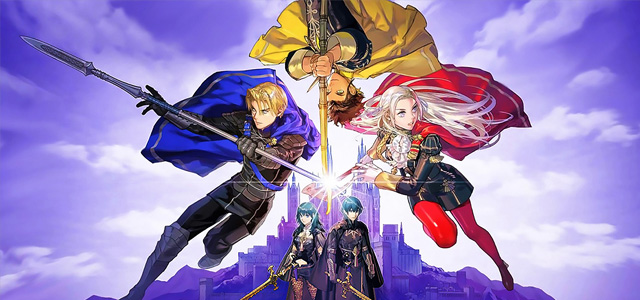Review: Fire Emblem
Three Houses
Fire Emblem, a turn-based combat series
that was in danger of being cancelled not so long ago, was effectively reborn
when Fire Emblem Awakening hit the 3DS.
It paired the series’ rock-solid turn-based strategy gameplay with a few tweaks
to make it less intimidating (including an option to play without the series’
infamous permadeath settings) and, most importantly, introduced a full slate of
romance options. In Awakening you
could pair your units up, and then eventually recruit their children, who would
arrive in-game from the future through time portals (bear with us here). Those
children could then, themselves, start dating, giving them a tactical advantage
when you paired them together on the battlefield.
Three Houses pares a lot of this
back, and instead feels most inspired by the Japan-only Fire Emblem II – remade for the 3DS as Fire Emblem Echoes: Shadows of Valentia in 2017. It brings back a
few elements that game introduced, such as its powerful Combat Arts abilities
that do more damage at the cost of some weapon stability. It also features more
RPG elements, as well as a large hub area to explore. Fire Emblem: Three Houses is a much stronger game than Shadows of Valentia though, with an
extraordinary wealth of content, a wonderful, engrossing plot, and loads of the
enjoyable, moreish combat the series is known for.
It also brings back Shadow of Valentia’s
‘rewind’ feature, which lets you return to earlier moments in a battle and try
again. Rewinding is essential if you’re playing the game in ‘Classic’ mode,
which has permanent death for units – lose them in battle and they’re gone
forever, unless you rewind or start over. Because of these concessions, and
because the game is, on average, just a bit easier than some of the really
tough Fire Emblem games (even on Hard
mode), I never hit that moment I’ve hit in almost every Fire Emblem game I’ve played – the one where I realise that to beat
the battle I’m stuck on, I’ll need to sacrifice a unit.
But that’s okay, because I also became far too attached to
my crew of fighters to let any of them lose their lives. Romance has also been
cut right back (although not entirely removed) in favour of a focus on platonic
relationships, and this ultimately serves the game’s narrative extremely well.
You’re not just guiding a bunch of couples through the game’s battles, but
rather a large group of individuals who, over the game’s lengthy playing time,
have become extremely close to one another. It’s easy to grow attached to these
people, thanks to an excellent script and brilliant voice acting (this is the
first Fire Emblem ever with a fully
recorded script).
The main character, Byleth – who you can choose the gender of, and who has a
standard RPG mysterious past that slowly unveils itself to be wild and
interesting – is tasked at the game’s opening with acting as the ‘professor’ to
one of three classes in a teaching monastery located in Fódlan, the game’s
fantasy setting. Your time playing is divided between battles and teaching, as
you instruct your class in the skills necessary to excel at battle. You pick
one of these three classes at the beginning, which fundamentally alters the narrative
– there’s more than enough incentive to play through the game multiple times,
especially since major decisions you can make during the campaign will alter
how each of the three paths will play out.
Fire Emblem: Three Houses is an
enormous game. It’s currently my second most played Switch game (after Zelda), out of the 120-or-so games I
have installed on the system, and it’ll likely claim the top spot as I go back
to replay it. It’s not just the narrative that keeps me coming back, either. Fire Emblem: Three Houses features some
of the deepest combat the series has ever enjoyed, and its ditching of the
series’ classic ‘weapon triangle’ – a rock-paper-scissors style system of
weapon strengths and weaknesses – does not hinder the game’s strategic depth
one bit.
Three Houses has one of the steadiest difficulty curves in the series, and as it gets more difficult, the plot also gets a lot darker. This is a game about needing to decide where your loyalties lie, and about which relationships matter most to you. Your story will change depending on how you play, and at certain points you’ll almost certainly be asked to do things you don’t want to. But that’s part of what makes the game so powerful – it’s got the best story of any game in the series.
Where Fire Emblem: Three Houses ultimately sits in the pantheon of Fire Emblem games will be up for debate once the dust has had some time to settle, but it’s a strong contender for, at least, the top three. While it can look a little plain, and there’s an awful lot of conversation to dig through, every possible fault you could have with the game fades away when your class is out on the battlefield, working together and risking their delicate lives while flexing the abilities you’ve helped them to cultivate. It’s easily one of the best games on the Switch.
Fire Emblem: Three Houses is now available on the Nintendo Switch.
James O’Connor is a critic and journalist.






